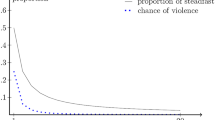Abstract
This paper introduces the three basic functions of P&E and analyzes its another implicit function of being a tool for power games.
Translated by Haoran Zhang and Qi Cui.
Access this chapter
Tax calculation will be finalised at checkout
Purchases are for personal use only
Similar content being viewed by others
Notes
- 1.
Busk (1967), p. 23.
- 2.
Anderson (2014a), p. 15.
- 3.
Yang (1992), p. 24.
- 4.
Nicholson (1969), pp. 98–99.
- 5.
McCaffree and Innis (1985), p. xii.
- 6.
Lu (2004), p. 250.
- 7.
Nicolson (1946), pp. 164–165.
- 8.
Satow (1994), p. 25.
- 9.
Anderson (2014b), p. 18.
- 10.
Lu (2006), p. 41.
- 11.
Huang Dongfa, “Zhou Enlai at Diplomatic Protocol Events,” Knowledge, No. 4, 1003, p. 28.
- 12.
Lv (2009), p. 53.
- 13.
Zhou and Yang (1990a), pp. 353–354.
- 14.
Li (2008), p. 161.
- 15.
Medvedev (1982), p. 134.
- 16.
Nicolson (1954), pp. 1–93.
- 17.
Zhou and Yang (1990b), p. 337.
- 18.
Iucu and Marinescu (2008), p. 16.
- 19.
Beaulac (1953), p. 32.
- 20.
Satow (1962a), p. 12.
- 21.
Beaulac (1953), p. 32.
- 22.
Cohen (1987), p. 142.
- 23.
Zhou and Yang (1990), p. 337.
- 24.
Morgenthau and Thompson (1985a).
- 25.
Miller and Bogdano (1992), pp. 594–595.
- 26.
Morgenthau (1993), pp. 109–110.
- 27.
Lu (2000), p. 42.
- 28.
Rees and Xiao (2013), p. 26.
- 29.
- 30.
Qin (2009), p. 85.
- 31.
De Coppet (1992), p. 98.
- 32.
Wu (2007), p. 102.
- 33.
Hevia (1995a), p. 21.
- 34.
Hevia (1995b), p. 28.
- 35.
Satow (1962b), p. 53.
- 36.
Berridge et al. (2001), p. 157.
- 37.
Lu and Huang (2004), p. 249.
- 38.
Morgenthau and Thompson (1985b), p. 89.
- 39.
Viola (2007), pp. 1–20.
- 40.
China News (2017).
- 41.
China News (2016).
- 42.
China News (2013).
- 43.
Kezer (1989), p. 105.
References
Anderson, M.S. (2014a). The rise of modern diplomacy 1450–1919 (p. 15). Routledge.
Anderson, M. S. (2014b). The rise of modern diplomacy 1450–1919 (p. 18). Routledge.
Beaulac, C. (1953a). I can put a man in his place. Saturday Evening Post, 225(37), 32.
Berridge, G. R., Keens-Soper, M., & Otte, T. G. (2001). Diplomatic theory from Machiavelli to Kissinger (p. 157). Palgrave Macmillan.
Busk, D. (1967). The craft of diplomacy: Mechanics and development of national representation overseas (p. 23). Pall Mall Press.
China News (2017). US media: Obama was late this year 200 times for a total of 2, 121 minutes, Phoenix News.
China News (2016). Putin was half an hour late for meeting with Park Geun-hye.
China News (2013). Putin was late for meetings with the heads of many countries, earning a nickname of ‘Late King,’ Global Times.
Cohen, R. (1987). Theatre of power: The art of diplomatic signaling (p. 142). Longman.
De Coppet, D. (1992). Understanding rituals (p. 98). Routledge.
Satow, E. M. (1962a). Guide to diplomatic practice (p. 12). World Affairs Press.
Satow, E. M. (1962b). Guide to diplomatic practice (p. 53). World Affairs Press.
Griddens, A. (1984). The consitution of society: Outline of the theory of structuration. University of California Press.
Nicolson, H. (1957). The evolution of diplomatic method: Being the, Chichele, Lectures delivered at the University of Oxford in. (November 1953) (pp. 1–93). Constable & Co. LTD.
Iucu, O., & Marinescu, P. (2008). Diplomacy and diplomatic protocol. Manager Journal, 8(1), 16.
Hevia, J.L. (1995a). Cherishing men from Afar, Qing guest ritual and the Macartney embassy of 1793 (p. 21). Duke University Press.
Hevia, J.L. (1995b). Cherishing men from Afar, Qing guest ritual and the Macartney embassy of 1793 (p. 28). Duke University Press.
Kezer, D. (1989). Ritual (p. 105). Yale University Press.
Li, J. (2008). Diplomacy and foreign affairs knowledge and international communication etiquette (p. 161). Guangxi Normal University Press.
Lu, P. (2006). Confrontation behind diplomatic etiquette. The South of China Today, 12, 41.
Lu, Y. (2000). The textual interpretation of postmodernity (p. 42). SDX Joint Publishing Company.
Lu, Y., & Huang, J. (2004). Introduction to diplomacy (p. 249). World Affairs Press.
Lu, Y. (2004). An introduction to diplomacy (p. 250). World Affairs Press.
Lv, C. (2009). There is no minor matter in protocol and etiquette. Office Administration, 12, 53.
McCaffree, M. J., & Innis, J. (1985). Protocol: The complete handbook of diplomatic (p. xii). Devon Publishing Company.
Medvedev, R. (1982). Khrushchev, translated by Brian Pearce, Blackwell, p. 134.
Miller, D., & Bogdano, V. (1992).Blackwell encyclopedia of political thought (pp. 594–595). China University of Political Science and Law Press.
Morgenthau, H. (1993). Politics among nations: Struggling for power and peace, translated by Xu Xin, Hao Wang, and Li Baoping (pp. 109–110). The Commercial Press.
Morgenthau, H. J., & Thompson, K. W. (1985a). Politics among nations: The struggle for power and peace. Knopf.
Morgenthau, H. J., & Thompson, K. W. (1985b). Politics among nations: The struggle for power and peace (p. 89). Knopf.
Nicholson, H. (1969). Diplomacy (pp. 98–99). Oxford University Press.
Nicolson, H. (1946). The congress of Vienna: A study of allied unity, 1812–1822 (pp. 164–165). The Viking Press.
Qin, Y. (2009). Relationality and processual construction: Bringing chinese ideas into international relations theory. Social Sciences in China, 3, 85.
Rees, T., & Xiao, Y. (2013). Globalization and power: The perspective of social constructivism. World Economy and Politics, 10, 26.
Satow, E.M. (1994). Guide to diplomatic practice (p. 25). Longman House.
Viola, L. A. (2007). Diplomatic ritual as power: Deliberation, ritualization and the production of legitimacy. In Conference Papers—International Studies Association, (pp. 1–20).
Wendt, A. (1999). Social theory of internatinal politics.
Wu, L. (2007). Chinese Etiquette Controversy, Civilization Tension and Power Contest (p. 102). Shanghai Classics Publishing House.
Yang, C. (1992). Germination and early evolution of diplomacy and establishment of permanent diplomatic mission. Foreign Affairs Review, 2, 24.
Zhou, Q., & Yang, C. (Eds.). (1990a). Diplomacy of other countries (pp. 353–354). Chinese People’s Public Security University Press.
Zhou, Q., & Yang, C. (Eds.) (1990b). Foreign diplomacy (p. 337). Chinese People’s Public Security University Press.
Author information
Authors and Affiliations
Editor information
Editors and Affiliations
Rights and permissions
Copyright information
© 2022 Foreign Language Teaching and Research Publishing Co., Ltd
About this chapter
Cite this chapter
Zhou, J. (2022). As a Tool of Power Games: The Implicit Function of Protocol and Etiquette. In: Zhou, J., Zhang, G. (eds) A Study of Diplomatic Protocol and Etiquette. Springer, Singapore. https://doi.org/10.1007/978-981-19-0687-9_5
Download citation
DOI: https://doi.org/10.1007/978-981-19-0687-9_5
Published:
Publisher Name: Springer, Singapore
Print ISBN: 978-981-19-0686-2
Online ISBN: 978-981-19-0687-9
eBook Packages: Political Science and International StudiesPolitical Science and International Studies (R0)




